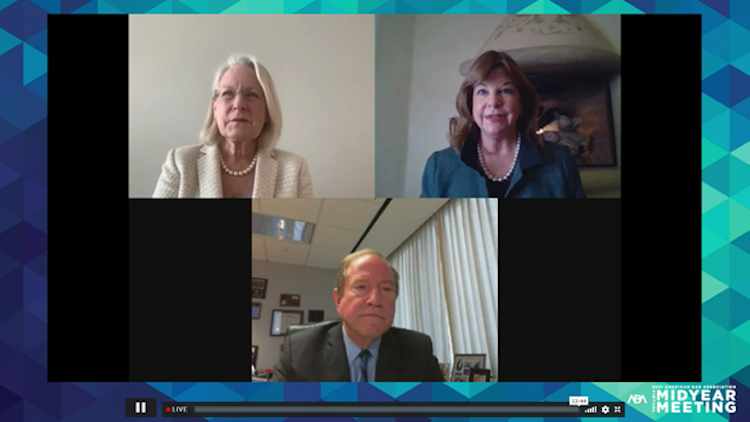ABA’s Practice Forward group puts focus on members' needs, well-being

Image from Shutterstock.com.
The challenges confronting the legal profession as a result of the COVID-19 pandemic have been a prime focus of the 2021 ABA Midyear Meeting.
In the first CLE program Wednesday, the ABA Coordinating Group on Practice Forward provided a sneak peek at results of a new ABA survey seeking to better understand issues that have impacted lawyers at work and at home.
In September and October, 4,400 people nationwide answered questions about how legal employers revised policies and procedures and whether diversity, equity and inclusion programs were affected because of COVID-19. Respondents also provided insight into the resources they need as they continue to work remotely or return to their offices after the pandemic.
The early results of the survey, which will be released in March, show that more than half of all lawyers are working from home 100% of the time. While most reported that they are just as productive, they often feel overwhelmed, said Stephanie Scharf, a principal with the Chicago-based Red Bee Group, which designed and managed the survey.
“They worry about: What are their employers thinking? Will they get the recognition they feel they deserve? What kind of job security do they have?” said Scharf, who is also a founding partner of Scharf Banks Marmor. “There are worries about client access and developing business. Billable hour requirements for the most part have not been reduced, and as a result, there are much higher levels of stress in trying to manage work and home responsibilities.
“There are higher levels of disengagement from work and greater thought about, ‘Is it really worth it?’”
Roberta “Bobbi” Liebenberg, another principal with the Red Bee Group, told program attendees that even though the transition to remote work affected all lawyers, it had a disproportionate impact on female lawyers with children and lawyers of color.
Because of the pandemic, she said female lawyers with children were more likely to experience increased child care responsibilities and disruptions to their work. According to survey results, this group often thinks that they are overlooked for opportunities and viewed as not committed to their firm or company.
“Given this data, it is not surprising that women lawyers, especially those with small children, were more likely to think it would be better to work part time,” said Liebenberg, a senior partner at Fine, Kaplan and Black in Philadelphia.
When asked what they needed to succeed, female lawyers said they wanted more supportive, engaged employers, as well as comprehensive plans for sick and family leave and subsidies for child care, family care and tutoring.
Follow along with the ABA Journal’s coverage of the 2021 ABA Midyear Meeting here.
The survey also asked respondents whether diversity, equity and inclusion strategies were put on hold because of the COVID-19 pandemic. Liebenberg said female lawyers and lawyers of color confirmed their work experiences changed in the past year, which they attribute to their race, ethnicity or gender.
As a result, they feel increased stress and less optimistic about their success and advancement in the legal profession.
“This data is very sobering, as it could potentially forecast a talent exodus with a disparate impact on women and lawyers of color at a time when clients are demanding that all along the pipeline, we see diverse talent,” Liebenberg said. “It is incumbent upon legal employers to remain laser-focused on the strategies necessary to develop a diverse group of lawyers.”
In considering their future work environments, some form of remote working appeals to most survey respondents, while more than one-third want the ability to choose their own schedule. In addition to supporting lawyers who prefer flexible arrangements, Scharf said legal employers should focus on well-being and workplace culture.
 Former ABA President Judy Perry Martinez, ABA President Patricia Lee Refo and Bill Bay, co-chair of the ABA Coordinating Group on Practice Forward.
Former ABA President Judy Perry Martinez, ABA President Patricia Lee Refo and Bill Bay, co-chair of the ABA Coordinating Group on Practice Forward.
When asked which ABA member services would be most helpful, female lawyers, lawyers of color and younger lawyers said they want more guidance about mental health and well-being and effective diversity, equity and inclusion programs. These groups also seek better resources for working parents, robust mentoring and sponsorship programs and opportunities to participate in pro bono programs.
“We believe there is a huge opportunity here for the ABA to be in the lead with guidance and other resources that members say they need, especially young lawyers,” Scharf said. “We know that ABA membership tilts toward older, more experienced lawyers, and of course there are law students and young lawyer ABA members, but as we emerge from the pandemic, now is an ideal time to think about what types of services will appeal to these up-and-coming lawyers.”
Scharf and Liebenberg briefly discussed best practices for legal employers, which includes strong leadership, frequent and transparent communications and revised firm compensation and billable hour requirements. These will be further examined in the full report.
The Coordinating Group on Practice Forward was created last May to help members identify challenges and opportunities facing the legal profession and justice system because of COVID-19. It is co-chaired by Bill Bay, a partner with Thompson Coburn in St. Louis, and Laura Farber, a partner with Hahn & Hahn in Pasadena, California.
After conducting the survey, the group submitted two resolutions to the House of Delegates based on its results.
Resolution 300A encourages courts, bar associations, legal employers and law schools to develop and make accessible resources, such as educational programming or employee assistance programs, to advance well-being in the legal profession.
The Coordinating Group on Practice Forward also asks these entities to adopt policies that encourage judges, lawyers and law students to use available resources.
The second measure, Resolution 300B, urges Congress and state, local, territorial and tribal legislatures to pass legislation and provide adequate funding to ensure access to “fair, affordable and high-quality child care and family care.”
The resolution, co-sponsored by the ABA’s Commission on Women in the Profession, also encourages bar associations, legal employers and law schools to implement policies and best practices that promote access to high-quality child care and family care by those in the legal profession.
The House of Delegates passed both resolutions overwhelmingly Monday.
See also:
ABA Journal: “Laura Farber gives her all to both local and national causes like the Tournament of Roses”
ABA Journal: “ABA’s Practice Forward group will help lawyers navigate rapidly changing profession”
ABA Journal: “How the ABA has adjusted to the COVID-19 pandemic”
Write a letter to the editor, share a story tip or update, or report an error.


